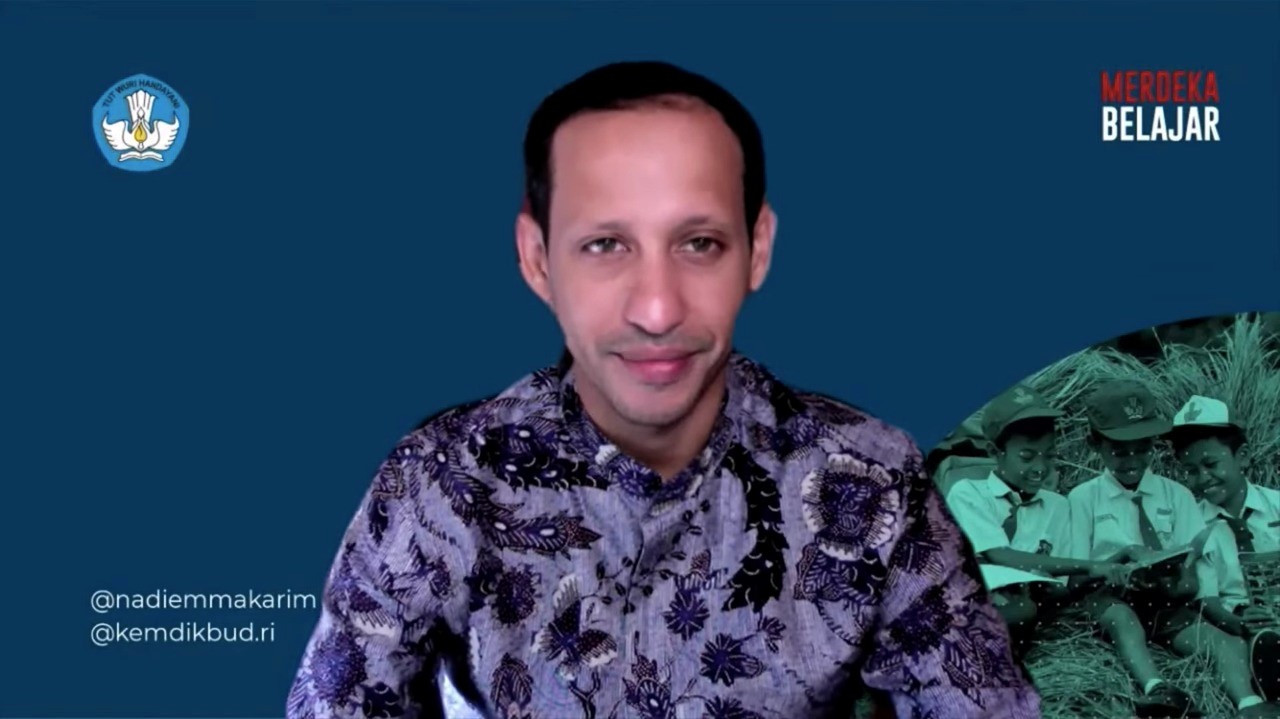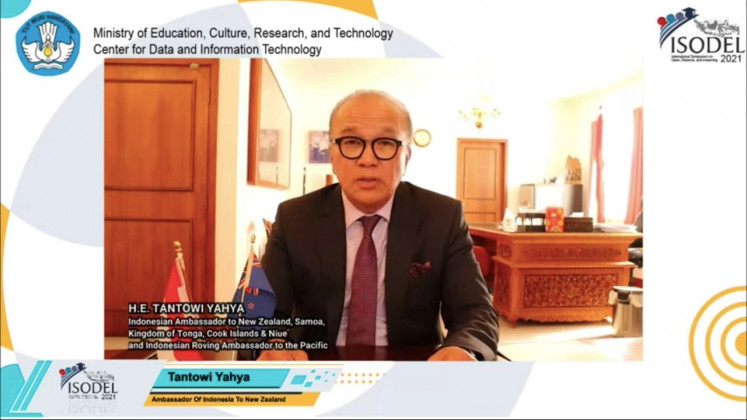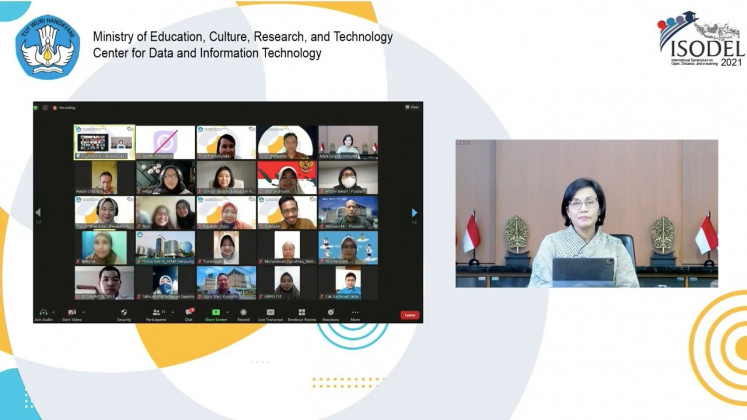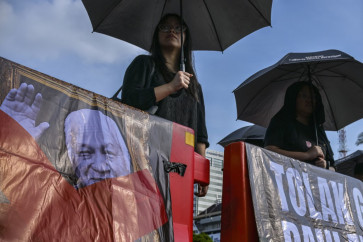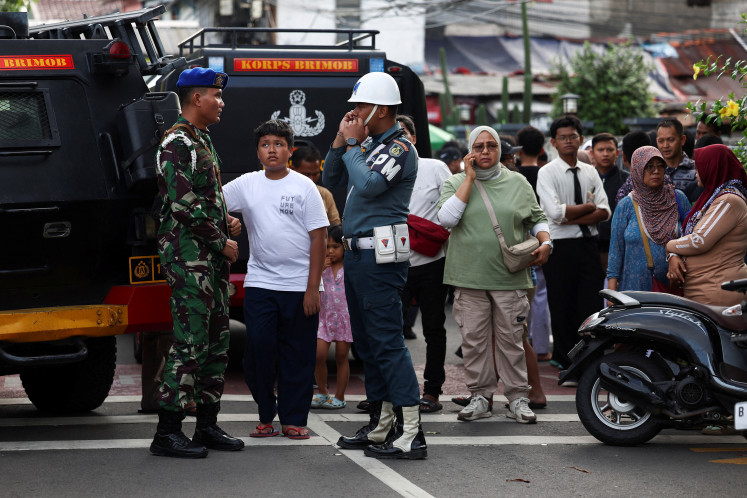Popular Reads
Top Results
Can't find what you're looking for?
View all search resultsPopular Reads
Top Results
Can't find what you're looking for?
View all search resultsISODEL highlights need for educators to innovate
The Center for Data and Information Technology of the Education, Culture, Research and Technology Ministry held the International Open, Distance and e-Learning Symposium (ISODEL) from Dec. 1 to 3.
Change text size
Gift Premium Articles
to Anyone
T
he Center for Data and Information Technology of the Education, Culture, Research and Technology Ministry held the International Open, Distance and e-Learning Symposium (ISODEL) from Dec. 1 to 3. The theme is “Educational Technology in the New Normal Era, Now and in the Future”. The event was held virtually and shows the collaboration between the ministry and various education stakeholders, including researchers, educators, community academics and practitioners in Indonesia and around the world responding to the dynamics and challenges that exist in the use of technology for education.
“We often hear the term technological disruption, which is a condition where the systems we use change rapidly due to technology. The world of education has an impact, so there is no other choice but to adapt and innovate to make disruption a solution,” said Education, Culture, Research and Technology Minister Nadiem Anwar Makarim in his speech.
He emphasized that the ministry was fully committed to the school digitalization program to expand access and to bridge the gap between knowledge and mastery of technology. In order to support this, the government has developed an educational platform that aims to help teachers in the learning process, because to continue to innovate, Indonesia needs a generation of digital talents who are creative and willing to contribute to the country. With the school digitalization program, the Indonesian education system will become more relevant and adaptive to changing times. Nadiem stated that the ideas born from the 2021 ISODEL would be valuable input for us to continue the independent learning movement.
The education ministry’s secretary-general, Suharti, expressed her gratitude to Finance Minister Sri Mulyani Indrawati, who has supported the implementation of all the policies and programs of the education ministry so far. She also pointed out that through ISODEL, she would hear and pay attention to all innovations that could improve the ability and quality of learning.
Tantowi Yahya, the Indonesian Ambassador to New Zealand, was the keynote speaker at the event. He mentioned that communication technology could preserve culture for three reasons: sustainable methods, large storage and expanding exposure, so that future generations could familiarize themselves with today's culture. He added that the education ministry was on the right path with digitalization.
The event was then divided into plenary sessions. The first focused on Industry 4.0, such as big data, the Internet of Things (IoT), artificial intelligence (AI), fintech, virtual reality (VR), augmented reality (AR), games, virtual classroom and more. Dr. R. Alpha Amirrachman, director of the Southeast Asian Ministers of Education Organization (SEAMEO) Indonesia, and Ms. Atsuko Okuda, director of the International Telecommunication Union (ITU) from the Regional Office for Asia and Pacific, were there as speakers.
They talked about the SEAMEO Regional Open Learning Centre, SEAMOLEC’s virtual reality-based learning, augmented reality to create a program in the form of SMILES (SEAMOLEC mini lecture series), as well as the importance of protecting the younger generation from the dangers of technology. They emphasized the need for a road map consisting of recommendations for scientific studies, regulations and implementation in the use of technology.
Massarow Syen, director of the Digital Education Institute of the Institute for Information Industry (III) Taiwan, was also present with Prof. Fransiskus Astha Ekadiyanto S.T., M.Sc., head of the Center for Independent Learning, University of Indonesia and Dr. Abi Sujak, M.Sc. from the education ministry. They talked about the importance of technological skills to be an educator, in order to facilitate students' digital competence, especially in content creation and responsible use of technology, so further studies with more complex designs can be accessible to all.
The second session was titled “Digital Educational Transformation: Closing the Digital Gap, to Reach the Unreach, Remote Area, Open Access, Flexible Learning, Disability Access.” Minister Sri Mulyani held a conversation with Prof. Zoraini Wati Abas, dean of the School of Distance Education at the Science University of Malaysia and Olivia Basrin from Google. They concluded that educational disruption was something that we could consider as a valuable opportunity to create new ways of learning and explore technological tools that will be useful to help overcome learning problems and challenges, especially at times like this in the midst of the COVID-19 pandemic. They also touched upon issues regarding digital inequality, access to inclusion and disability, open access and flexible learning. They discussed ideas on how to provide solutions and mentioned that the government supported programs through a budget that could improve infrastructure and access to communication for all citizens.
Another plenary session with Prof. Marito Garcia of Virginia University, Prof. Dr. Paulina Pannen, M.Ls as director of ICE and Vincent Quah of Microsoft, resulted in the conclusion that in terms of digital transformation for successful learning and transition to work, there are four stages that must be considered: the admission and registration stage, the student school experience stage, the student learning experience stage and the transition to work and engagement stage.
The pandemic has highlighted the fact that educators are not ready in terms of their technological competence. In the future education must consist of education itself, entrepreneurship and employment. Therefore, education in Indonesia must carry out reskilling and up-skilling. Minister Sri Mulyani stated that more than Rp 100 trillion was budgeted for education, research and cultural funds, so as to increase the capabilities of Indonesian citizens. For this reason, the most vulnerable families need to be assisted. Moreover, the government also provides scholarships that can be used by all Indonesians to get a better education.
The budget is also used to build communication network infrastructure, because there are more than 20,000 families who do not have access to an internet connection throughout Indonesia. Subsidies are also provided, one of which is internet data quota assistance, which can provide easy internet access to all students, teachers and lecturers for the learning process during the pandemic.
The implementation of ISODEL presented “Character Building: Digital literacy, 21st century skills (critical thinking and problem solving, collaboration, communication, creativity and innovation), life skills learning to be, learning to do, learning to learn, learning to live together” and included presentations from researchers who had provided their research results in the implementation of ISODEL 2021 in parallel classes.

